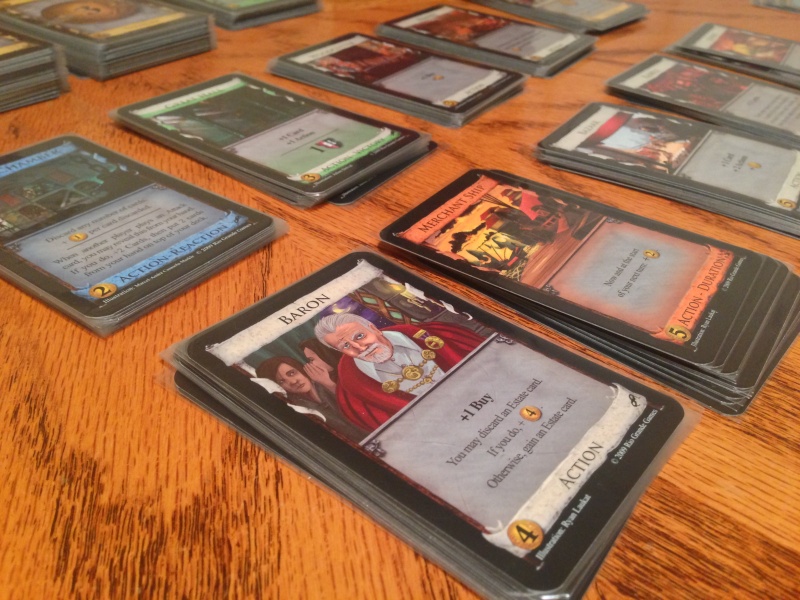 For as long as there have been modern abstract board games there have been people arguing about what exactly the definition of abstract is. Can it have a theme? Hidden information? Any amount of randomness? Special powers?
For as long as there have been modern abstract board games there have been people arguing about what exactly the definition of abstract is. Can it have a theme? Hidden information? Any amount of randomness? Special powers?
Well Orion Duel is not going to cause any debates: this is about as abstract of a game as there can be. No cards, no dice, no unpredictable outcomes. I guess you could argue that there is a very light coating of “space” theme but only about as much as Chess is about medieval war. So now the only argument left to have is if it deserves a space in your board game collection.
Gameplay Overview:
The gameplay in Orion Duel is exceedingly simple. The game starts with a number of galaxy and black hole tokens being added to a hexagonal board. Each player has pieces that will cover 1-3 hexes. All of the three hex pieces include two hexes of your color and one of your opponents, and most of the 2-hex pieces are one of each color. You do have just 2 pieces you can place that only contain your own color, one 1-hex piece and one 2-hex piece.
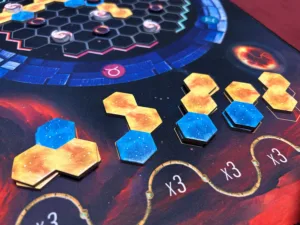
On your turn, place one of your pieces anywhere on the board so long as it is currently empty. If there is a previously placed piece adjacent to a galaxy or black hole token you can place a new piece under that, so long as the color connects to the previously played color. And you’ll keep taking turns playing pieces to the board until one of three victory conditions are met:
- You’ve created a connection of four galaxy pieces on an unbroken chain of your own color.
- The opponent has three connected black holes.
- There is an unbroken chain of your own color from one edge of the map to the opposite edge.
That’s it, as soon as one of those three things happens you win and the game is over.
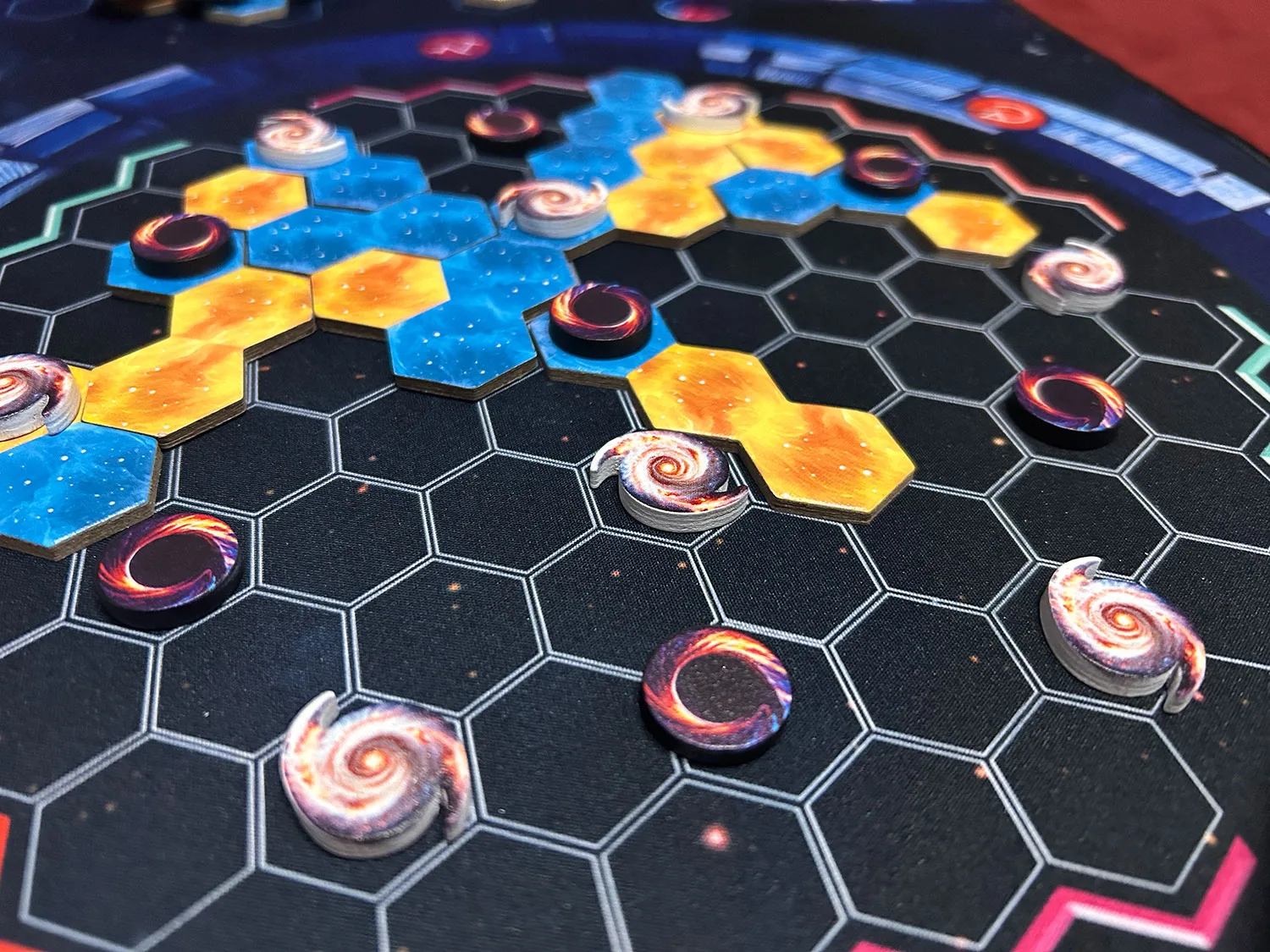
Game Experience:
Orion Duel is firmly in the category of no-luck abstract games. There is no randomness involved and nothing to hide from your opponent. You just have to outplay your opponent (or hope they fall asleep as you start attaching galaxies together).
Generally, I love abstract games for their low rules overhead and tactical decision making. Orion Duel is certainly quick to teach. It honestly may take longer to find the box off your shelf and open it up than it takes to explain how it all works. And most games will play out in just 10-15 minutes.
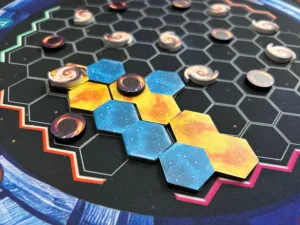
What gives Orion Duel its strategy comes down to the multiple win conditions. Given no randomness or hidden information you are generally telegraphing to your opponent what your plans are. If I place a hex in such a way that it adds a black hole under your color it’s not exactly a secret that I’m thinking about connecting you to as many of them as possible and watching you get sucked into the endless void… or whatever happens in a black hole. You can fairly easily fight that off and block off your color from the nearby black holes or maybe start putting them under my pieces.
You can’t win this fight by attacking on a single front. You want to be progressing towards multiple goals at the same time if at all possible. Or at least playing in a way that leaves options open. Given that most of your pieces also add the opposing color you also have to be careful not to unintentionally open up avenues for your opponent as you go.
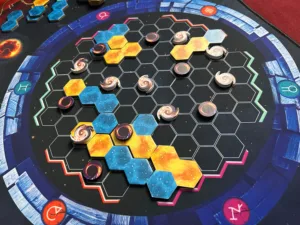
The layout of the galaxies and black holes on the map can also change from game to game. There are some prescribed options in the rulebook but you can also start the game by taking turns placing them on the map for a little more strategy to get things going. Although given that players don’t really “own” any particular side of the board it didn’t feel like there was a ton of thought to put into those setup decisions. While I don’t think this type of variability necessarily makes the game itself more replayable it does prevent it from having any certain best moves that might be the case on a static board.
There’s not a lot to dislike about Orion Duel. But, I also just found myself not really drawn to getting it off the shelf over and over again. Ultimately the fact that the winning conditions often boil down to just connecting things together by placing hexes just leaves it feeling a little unexciting. Not that abstracts are generally action-packed but Orion just plays out maybe a bit too quietly. Instead of feeling like you might be behind and then ahead after a big move, it all feels mostly marginal until someone makes the placement that gives them two ways to win on their next turn and all that’s left for you to do is slap your forehead.
Final Thoughts:
If you are a fan of abstract games I would recommend giving Orion Duel a try. It feels different enough that it’s worth the experience for fans of the genre. It certainly checks the normal boxes of things I want from my abstracts—quick to learn and emergent tactics.
It’s hurt a little bit perhaps by just how simple it is. Each individual turn never feels like a big swing and hinges mostly on a bit of cat-and-mouse between players and exactly how many different victory conditions they can keep progressing on simultaneously.
Final Score: 3.5 Stars – A solid abstract for fans of the genre that just didn’t have me rushing back to it.
 Hits:
Hits:
• Quick teach
• Multiple strategies emerge after each play
• Variable setup prevents rote opening moves
Misses:
• Placement of tiles sometimes felt underwhelming
• Lacks a real defining quality that sells the game







